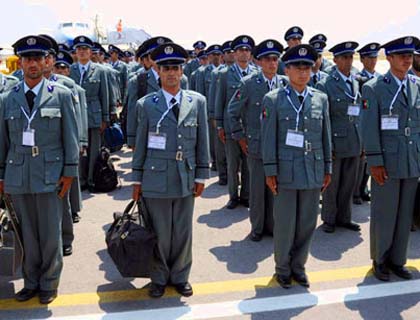KABUL - World powers must share the cost of training Afghan security forces once foreign troops leave in 2014 because the United States cannot be expected to continue paying about $12 billion a year, French diplomatic sources said on Tuesday.
The sources said that Paris expected next week's conference in Bonn marking the 10-year anniversary since the fall of the Taliban, as well as another meeting in Chicago next year, to clarify how the Afghan army would be financed − a critical measure to ensure the country's post-NATO stability.
"We don't really have a choice. If we're pulling out foreign troops after 2014 then in some way there must be an international effort to support forces that can maintain security," said one source.
"If we don't decide in the coming months what will happen after our departure then we have to ask what we were doing in the country."
NATO is racing against the clock to train Afghanistan's police and army forces, expected to reach 350,000-strong in order to take over fighting an increasingly violent war.
The United States poured in a record amount, near $12 billion between October 2010 and September 2011, to train and equip Afghanistan's security forces. Almost as much cash, some $11 billion, is planned for the year through September 2012.
"For all of us there is a budgetary issue and with U.S. spending $12 billion a year it's natural to see how they will reduce that," one of the French sources said.
"Until now they have accepted to pay the majority, but we expect them to ask how better to share the burden."
France − whose financial contribution to the training is minor − is pulling another 200 troops from its 3,800 strong force by the end of the year.
By the end of 2012, 1,000 in total are due to leave, a move that could prove a boost to President Nicolas Sarkozy in advance of a presidential election in April in which his Socialist rival, Francois Hollande, is favored in polls to win.
But at a time when Paris is trying to balance its finances and Europe faces its worst economic crisis since the end of World War Two, any sign France will have to cough up more to stabilize Afghanistan is unlikely to go down well with voters.
France spends about 500 million euros ($668 million) a year on its Afghan operations. The objective is to cut the number of Afghan troops being trained to about 230,000 by 2017, which would eventually reduce the annual bill to about $3-$4 billion.
The sources said it would be logical for partners that have not contributed until now to help pay the costs. Ninety-one delegations will be attending the Dec. 5 Bonn conference.
"The less troops that are trained, the less the bill will be, but it will still be a considerable (financial) effort," said one source.
"It's high risk, because fatally for us, by continuing to train (Afghans) it will mean a rise in our contributions which for now are pretty low."
Violence in Afghanistan is at its worst since U.S.-backed Afghan forces overthrew the Taliban in 2001. More than 2,500 foreign troops have died in Afghanistan since the war began, with 76 French soldiers having been killed since France joined the Afghanistan operations 10 years ago.
"Today there is an extremely ambitious base that we may not be able to keep, but at the same time we have to find a financing model that is more sustainable in the long-term where ultimately the Afghans are responsible for financing its own security forces," said one source.
The Bonn conference, described by sources as a "catalyst" for future decisions, will gather ideas on how to consolidate the post-2014 era. It will focus primarily on how Afghans will organize their sovereignty, on long-term partnerships from the international community with the local authorities and recognition that a political solution is necessary.
Sources said that any document that emerges from the Bonn conference will be "watered-down", given the difficulty of finding consensus among 91 delegations. Germany, they said, is pushing to have an Afghan presence at the conference that could include representatives close to the Taliban. (AP)

